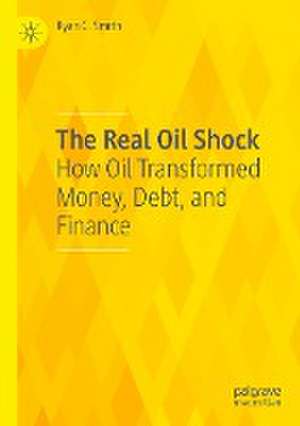The Real Oil Shock: How Oil Transformed Money, Debt, and Finance
Autor Ryan C. Smithen Limba Engleză Paperback – 2 sep 2023
| Toate formatele și edițiile | Preț | Express |
|---|---|---|
| Paperback (1) | 636.80 lei 6-8 săpt. | |
| Springer International Publishing – 2 sep 2023 | 636.80 lei 6-8 săpt. | |
| Hardback (1) | 642.18 lei 6-8 săpt. | |
| Springer International Publishing – sep 2022 | 642.18 lei 6-8 săpt. |
Preț: 636.80 lei
Preț vechi: 749.19 lei
-15% Nou
Puncte Express: 955
Preț estimativ în valută:
121.85€ • 132.77$ • 102.68£
121.85€ • 132.77$ • 102.68£
Carte tipărită la comandă
Livrare economică 23 aprilie-07 mai
Preluare comenzi: 021 569.72.76
Specificații
ISBN-13: 9783031071331
ISBN-10: 3031071336
Ilustrații: XIX, 242 p. 56 illus., 37 illus. in color.
Dimensiuni: 148 x 210 mm
Greutate: 0.32 kg
Ediția:1st ed. 2022
Editura: Springer International Publishing
Colecția Palgrave Macmillan
Locul publicării:Cham, Switzerland
ISBN-10: 3031071336
Ilustrații: XIX, 242 p. 56 illus., 37 illus. in color.
Dimensiuni: 148 x 210 mm
Greutate: 0.32 kg
Ediția:1st ed. 2022
Editura: Springer International Publishing
Colecția Palgrave Macmillan
Locul publicării:Cham, Switzerland
Cuprins
Chapter 1: Understanding Money and Finance.- Chapter 2: It Was the Best of Times, It Was the Worst of Times.- Chapter 3: When Oil Shocked the Globe.- Chapter 4: A Monetary Revolution.- Chapter 5: Private Sector Takes the Control.- Chapter 6: A New Global Debt Cycle.- Chapter 7: Adapting with Derivatives.- Chapter 8: Revolution and Oil Shock.- Chapter 9: The Crash of 1982.- Chapter 10: Conclusion.
Notă biografică
Ryan C. Smith is an independent scholar specializing in modern finance, the oil industry, energy and geopolitics, and the Middle East. He received his Ph.D. in Economic and Social History from the University of Glasgow in 2022.
Textul de pe ultima copertă
"Understanding the role of oil in our past, as this absorbing volume undertakes to do, informs a good deal about our present plight. And it should make us resolve to kick fossil fuel once and for all, for the far more democratic forms of energy now available to us."
Bill McKibben, author of The Flag, the Cross, and the Station Wagon: A Graying American Looks Back at his Suburban Boyhood and Wonders What the Hell Happened
“Ryan Smith offers a new and challenging perspective on the OPEC oil crisis and its aftermath drawing on contemporary theories that rethink the nature of money, debt and finance.”
Mary Mellor, Professor Emeritus at Northumbria University (UK) and founding Chair of the University's Sustainable Cities Research Institute
The rise of the global financial industry is treated by many economists as a critical component of the rise of neoliberalism. What few address is the role of the 1973 OPEC Oil Embargo and the 1979 Oil Shock inmaking modern financialization possible. Here, it will be demonstrated that the dramatic transfer of wealth from the industrialized, capitalist world to OPEC’s members triggered by the Oil Embargo and the Oil Shock created a vast pool of liquid capital. Oil prices inflation, as a result of Embargo and Shock, also triggered a balance of payments crisis that created unprecedented global demand for credit. Processing this capital and mitigating the inflationary pressures which followed the 1973 Shock encouraged the development of more liquid, internationally mobile instruments that made financialization possible and ushered in the effective privatization of money creation. This transformation of the creation of money, the rise of a new global debt cycle, and petrocapital-fuelled changes to financial practices laid the foundations of modern finance and the neoliberal world order as we know them. Ryan C. Smith is an independent scholar specializing in modern finance, the oil industry, energy and geopolitics, and the Middle East. He received his Ph.D. in Economic and Social History from the University of Glasgow in 2022.
Bill McKibben, author of The Flag, the Cross, and the Station Wagon: A Graying American Looks Back at his Suburban Boyhood and Wonders What the Hell Happened
“Ryan Smith offers a new and challenging perspective on the OPEC oil crisis and its aftermath drawing on contemporary theories that rethink the nature of money, debt and finance.”
Mary Mellor, Professor Emeritus at Northumbria University (UK) and founding Chair of the University's Sustainable Cities Research Institute
The rise of the global financial industry is treated by many economists as a critical component of the rise of neoliberalism. What few address is the role of the 1973 OPEC Oil Embargo and the 1979 Oil Shock inmaking modern financialization possible. Here, it will be demonstrated that the dramatic transfer of wealth from the industrialized, capitalist world to OPEC’s members triggered by the Oil Embargo and the Oil Shock created a vast pool of liquid capital. Oil prices inflation, as a result of Embargo and Shock, also triggered a balance of payments crisis that created unprecedented global demand for credit. Processing this capital and mitigating the inflationary pressures which followed the 1973 Shock encouraged the development of more liquid, internationally mobile instruments that made financialization possible and ushered in the effective privatization of money creation. This transformation of the creation of money, the rise of a new global debt cycle, and petrocapital-fuelled changes to financial practices laid the foundations of modern finance and the neoliberal world order as we know them. Ryan C. Smith is an independent scholar specializing in modern finance, the oil industry, energy and geopolitics, and the Middle East. He received his Ph.D. in Economic and Social History from the University of Glasgow in 2022.
Caracteristici
Links not only money creation, but also innovation, in the financial industry to the oil shocks of the 1970s Deepens the known relationships between oil wealth and the global financial system Appeals to readers interested in economics, modern global history, neo-liberalism, the Middle East, and finance
